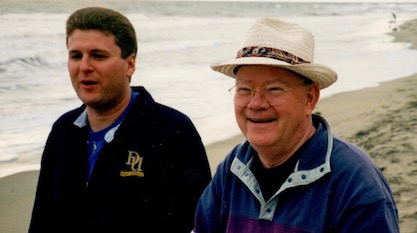 Culture & Ethics
Culture & Ethics
 Faith & Science
Faith & Science
Phillip E. Johnson: A Reading List from Gandalf

Editor’s note: Phillip E. Johnson, Berkeley law professor and author of Darwin on Trial and other books, died on November 2. Evolution News is sharing remembrances from Fellows of Discovery Institute. John Mark Reynolds blogs at Patheos where this was originally published. A philosopher, administrator, and Platonist, Dr. Reynolds is president of The Saint Constantine School in Houston, Texas.
I have known Socrates and Gandalf, or at least men in this life who modeled the virtues of these heroes, historical and mythical, in the 21st century. Saturday I learned the man I called Gandalf had gone into the West.
Phillip E. Johnson was a man who lived by words: watch an interview when he was healthy and you will see a man who swam in English like a dolphin loved water.
Whenever we talked, and we never stopped talking, writing, communicating, he would point to articles I should read (last talk he recommended getting Commentary) or a book I should buy. His was a literary life, there is no accident in his turning from Genesis 1 to John 1. This is a man who loved words and so learned, later in life, to love the Logos.
That Hideous Strength
I doubt that a single month passed when one of us did not refer to Lewis’ prophetic book. Johnson thought that the NICE had taken over the university and the result were lies, stagnation, and administrative bloat at the expense of swashbuckling intellectual activity.
Phil loved forcing the Withers of the academy to state their puffery in plain terms. He knew that much of what was said at Harvard, the Supreme Court, Chicago, or Berkeley made no sense if put in plain English. Phil was a Merlin at forcing people to expose the Babel they spoke.
Few understood his opposition to Darwinism began in hatred for the bully boy tactics used by “the establishment.” For good or ill, Phillip E. would give anyone a hearing who faced mindless opposition. Sometimes the mindless stumbled onto truth, but Phil was still skeptical.
Often he would joke with me that he would switch sides if his team ever “won.” He hated the shadow of that hideous strength that much. He never hated the Christian academic establishment as much as the secular one only because he thought it unworthy of a brilliant man’s disdain: Christian colleges were mediocrity captured by envy of brilliance in thrall to evil.
The Lord of the Rings
If Gandalf of Tolkien fame made the Council of Elrond possible, then Phil made many such councils possible. We are not the only ones to meet their best friends and co-laborers at meetings Phil convened. Each year at Pajaro Dunes, he convened jollification and bid us to, in the words of a favorite film (The Court Jester), have a life that could not possibly better be.
In the last few years, he pushed me (hard!) to do new things and not get stuck in the rut of the higher education bubble. Instead, he th0ught, we should push the Ring so close to the Mount that only a miracle could save us. He cared nothing for hits, links, or reputation after his first stroke.
He cared for the Good, Truth, and Beauty. He was, however imperfectly, genius in service to all: Gandalf serving the Shire.
Hamlet
Phillip E. loved theater. He introduced us to brilliant, luminous, opera friends who transformed my life. That an analytic philosopher eventually led an opera tour of Europe was utterly due to his influence. He would reference an opera more often than a legal case.
During the O.J. trial, he predicted the outcome correctly, and then moved on to musical theater. This was, he thought, what mattered most. Oddly, Phillip E. had seen me unknowingly in a bit of street theater before we knew each other. He referenced this in our last call.
He knew Shakespeare, not as a scholar, but a man from the era when Shakespeare was the property of everyone. If I said anything, he knew a Shakespearean quotation and referenced it, not in an affected way, but the way a friend knew a friend.
Reason in the Balance
This is Phil’s best book: a book that I read as Johnson wrote it. He produced each chapter more or less as it was published in sequential emails: Phil did not do rough drafts. He could recall the passage he wanted and quote it, looking up the reference later. He despised the lazy naturalism of his fellows in the university elite and he makes a readable case for the rest of us: reason in the balance.
In the end, Phillip E. was reading about life after death, thinking hopefully and skeptically, and many other topics. I never knew what we would discuss in any given call. His policies and politics kept evolving with data. He would admit where he had been wrong, where those he inspired had surpassed him, and where the data kept moving.
He came back to John 1:1 always: the Word was first and not chaos. His highly trained, logical mind, was never persuaded that in the beginning was anything but logic. If you don’t like all his details, then value his daemon, the Socratic passion for the word, reason, logic over chaos, power, illogic.
If nothing else, watch Danny Kaye in The Court Jester and know that Phil was a cheerful man who thought life, including the world to come, could not possibly better be!
Photo: John Mark Reynolds and Phil Johnson, Pajaro Dunes, California, June 1998, by Suzanne Nelson.
